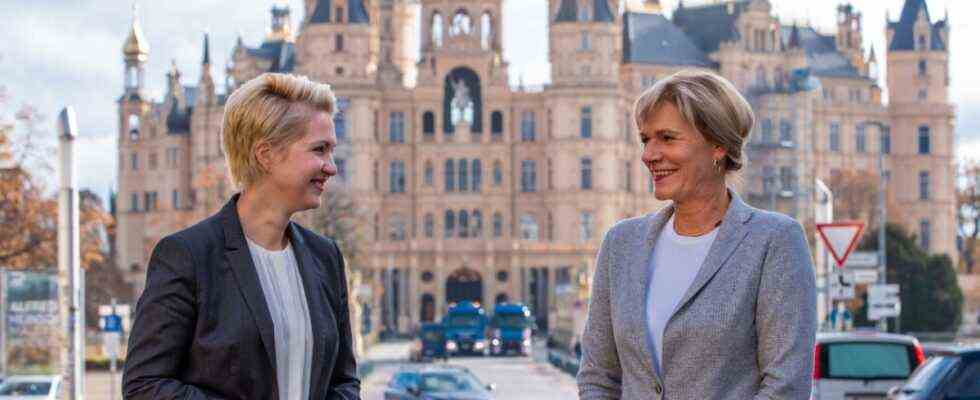The SPD and the left in Mecklenburg-Western Pomerania have quickly joined forces, and the red-red experiment can begin shortly. “So now color comes into play,” says Simone Oldenburg, the left parliamentary group leader and presumably soon number two in the German northeast.
At the end of September, the SPD Prime Minister Manuela Schwesig clearly won the state election, in mid-October she finished explorations with her previous junior partner CDU and called Simone Oldenburg from the Left. Fleet 26 days later, the joint coalition agreement was presented on Monday in Schwerin. Red-red instead of red-black, the duo have even planned a new holiday. It should be March 8th, International Women’s Day.
Two women played a key role in promoting the pact until 2026; when the strategy paper was presented, they stood side by side like old friends. Left Manuela Schwesig, SPD, 47 years old, the head of government and election winner. Right Simone Oldenburg, 52 years old, negotiator of the left and designated vice-chairman in the Schwesig cabinet. Whenever there was a question during the press conference, one of the two carried the microphones to the other’s desk, not very practical, but extremely attentive.
The CDU only got 13.3 percent in the election
On Saturday, party congresses are to approve the 77 pages and 26,800 words of the agreement. In a week, on November 15, the incumbent Schwesig is to be re-elected in Schwerin Castle and her state government appointed. Together, the two parties occupy 43 of the 79 seats, which is enough for the turning point. The pact between the SPD and CDU, which lasted for 15 years and recently crumbled more and more, is over.
The SPD has ruled the state since 1998, and its era on the Baltic Sea and Lake District also began with the Left. At the time, however, that was the PDS, the party of democratic socialism. The first experiment with the SED’s successor at the time lasted eight years, together they rehabilitated the budget, and some left-wing voters disliked the austerity program. In November 2006, for the sake of a certain majority, it became an SPD-led grand coalition. Now, under Schwesig’s aegis, the role is backwards, which has to do with the downfall of the CDU and a shedding of the regional left.
The SPD got almost 40 percent of the vote, the CDU only 13.3 percent, third place behind the AfD (16.7 percent). The left also lost and came to 9.9 percent, but seems more orderly and stable in Mecklenburg-Western Pomerania than the Union. The opposition recalls the Stasi past of a left-wing co-negotiator, but he had already admitted his previous collaboration years ago and apologized. Instead of a sharp shift to the left, the proposed government program sounds more like a socially cushioned continuation of previous government work.
Manuela Schwesig promises a “solid financial policy”, with investments in, among other things, hydrogen technology and the digitally miserable infrastructure. “Awakening 2030” is the motto. It will also be interesting to see how the Nord Stream 2 pipeline will continue, Schwesig’s SPD and Oldenburg’s Linke are in favor of the highly controversial gas pipeline from Russia.
The program does not sound like a left-wing revolution
The SPD and the Left want to lower the voting age in the country to 16 years. In schools, where so many teachers are missing that educators from Poland have to help, 1000 new jobs are to be created within five years. More and better paid staff is also planned at daycare centers, and a ticket for one euro a day is being planned for senior citizens and trainees. A nationwide system of on-call buses is to connect remote towns, agriculture is to become more environmentally friendly, and ecologically managed cultivation is to grow by a third by 2026. It is not a left-wing revolution.
Who gets which job in the red and red squad? The most sensational rumor is about Dietmar Bartsch, a candidate for the post of interior minister according to NDR. Bartsch from Stralsund is still co-chairman of the left parliamentary group in the Bundestag. Under the CDU leadership, there was chaos in Mecklenburg-Western Pomerania’s Ministry of the Interior, including the Office for the Protection of the Constitution.
Personal details will be announced in the course of the week, the Minister of Education will most likely be the teacher Oldenburg, who will soon be Deputy Prime Minister. Your future supervisor Schwesig would certainly have been able to report for the SPD federal chairmanship, but for the time being she is concentrating on her territory. Were the conversations with the left really that harmonious? “There was actually no argument, no argument,” replies Simone Oldenburg. According to Manuela Schwesig, “perhaps it was also because two women negotiated”.

